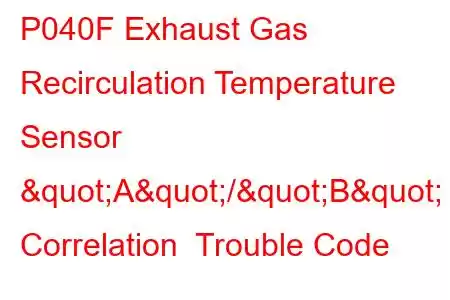P040F EGR Temperature Sensor A/B Correlation
OBD-II Trouble Code Technical Description
Exhaust Gas Recirculation Temperature Sensor A/B Correlation
What does that mean?
This diagnostic trouble code (DTC) is a generic powertrain code, which means that it applies to OBD-II equipped vehicles (Ford, Seat, Chevy, GMC, Ford, Dodge, Sprinter, VW, Subaru, etc.). Although generic, the specific repair steps may vary depending on make/model.
If your OBD-II equipped vehicle has presented a stored code P040F, it means that the powertrain control module (PCM) has detected a discrepancy between the primary and secondary (A and B) exhaust gas recirculation (EGR) temperature sensors. A stored code P040F may be the result of a mechanical issue or an electrical malfunction.
The EGR system is designed to deliver a portion of spent exhaust gases back to the intake manifold so that it can be burned a second time. This process is required to reduce nitrous oxide (NOx) particles that are released into the atmosphere. NOx is a contributing component of ozone depleting exhaust emissions and NOx emissions are regulated by federal mandate.
EGR temperature sensors are (to my knowledge) relegated to diesel engine equipped vehicles. In most cases, engine coolant is used to reduce the temperature of engine exhaust gases before they are drawn into the EGR valve. A and B EGR temperature sensors provide the PCM with variations in exhaust gas temperature near the EGR valve. The PCM compares input signals from the two EGR temperature sensors and an exhaust temperature sensor to determine if the EGR cooling system is operating efficiently.
The EGR temperature sensors are located near the EGR valve and the exhaust temperature sensor is usually positioned in the down pipe. If the EGR temperature sensor input voltage signals are not within programmed specifications, or if the input signals from the EGR temperature sensor/s are not significantly lower than that of the exhaust temperature sensor, a P040F will be stored and a malfunction indicator lamp may be illuminated.
Other EGR temperature sensor trouble codes include P040A, P040B, P040C, P040D, P041A, P041B, P041C, P041D, P041E, and P041F.
Code Severity & Symptoms
Since P040F is related to the exhaust gas recirculation system, it is not classified as a severe code.
Symptoms of this code may include:
There may be no symptoms when this code is stored Diminished fuel efficiency Coolant leak Exhaust leak Exhaust temperature sensor codesCauses
Potential causes for this code to set are:
Low engine coolant Defective EGR temperature sensor/s Faulty exhaust temperature sensor Exhaust leaks Clogged EGR cooler Engine overheatingDiagnostic and Repair Procedures
A diagnostic scanner, a digital volt/ohmmeter, a reliable vehicle information source (All Data DIY), and an infrared thermometer (with a laser pointer) are some of the tools that I would use to diagnose a P040F.
You may begin with a visual inspection of the wiring harnesses and connectors associated with the A and B EGR temperature sensors and the exhaust temperature sensor. Carefully examine harnesses that are in close proximity to hot exhaust pipes and manifolds.
Next, connect the scanner to the vehicle diagnostic connector and retrieve all stored codes and freeze frame data. Write this information down because you may need it if this proves to be an intermittent code. Now, clear the codes and test drive the vehicle to see if it is reset.
If the P040F is reset, I would use the scanner data stream to determine whether there is actually a correlation problem between the two EGR temperature sensors or if there is a PCM or programming error. By narrowing the scanner data stream to include only pertinent information, you can get a quicker and more accurate data response. If the scanner indicates tha
Read: 42


